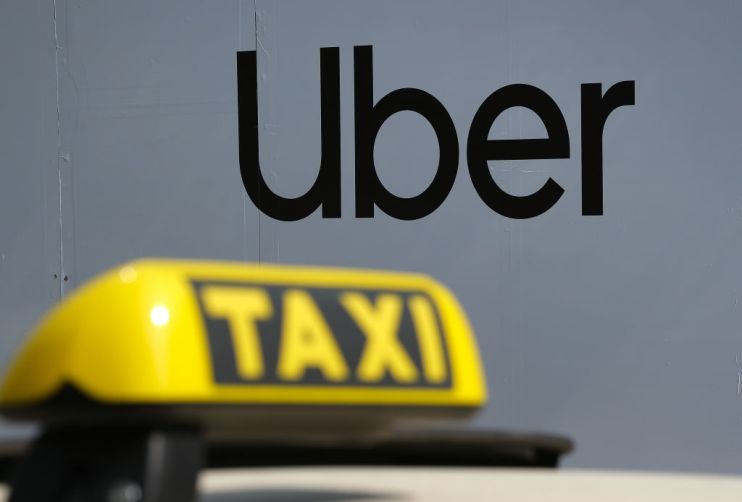Uber: What does the workers’ rights U-turn mean for the ride-hailing giant?

Uber agreed yesterday to give its 70,000 UK drivers holiday pay and pensions following a landmark ruling in the Supreme Court.
The court ruled that all UK drivers are employees of the taxi giant — rather than being self-employed — and are therefore eligible to receive holiday pay on a fortnightly basis.
Susannah Streeter, senior investment and markets analyst at Hargreaves Lansdown, said: “It has become clear that the Supreme court’s decision last month steered Uber into a dead end in its fight to keep those behind the wheel on self-employed contracts.
“Throwing in the towel is likely to come at a significant cost to the company,” she warned.
Mick Rix, GMB national officer, said: “Uber had to be dragged kicking and screaming to do the right thing, but finally they’ve agreed to follow the ruling of the courts and treat their drivers as workers.”
Gig economy
Analysts are unsure of what this means for the future of the gig economy, as other companies will likely be forced to reevaluate their business models.
‘’Uber’s decision to reclassify its 70,000 drivers as workers will reverberate through the entire gig economy,” Streeter said.
“It is likely that other operators will now be forced to reassess the employment status of the drivers they have relied on to develop lucrative businesses.”
GMB, the union which spearheaded the Uber case through four court battles, agreed this is the window for the gig economy to make necessary changes.
“Other gig economy companies should take note – this is the end of the road for bogus self-employment,” Rix added.
Law firm DMH Stallard partner Rebecca Thornley-Gibson echoed GMB’s sentiment as “the gig economy continues to face challenges on how to treat individuals who earn their living from it.
“Non-traditional working structures do not always result in an abdication of employment rights and it is likely we’ll see a further extension of employment rights to more individuals.”
Workers’ rights
The decision marks a positive shift in the industry, but holiday pay and pensions are just the tip of the iceberg for some.
Law firm Leigh Day, which represents over 4,000 Uber drivers in workers’ rights claims, confirmed it will be continuing its claim on behalf of the workers who previously missed out on employee benefits.
Nigel Mackay, employment team partner at the firm, indicated that “so far, Uber has not promised to properly compensate its drivers for its past failure to provide paid holiday and national minimum wage and our claim for back pay on behalf of 4,000 Uber drivers will continue”.
There are also some details of the ruling that are yet to be determined, including how Uber measures employees’ working hours.
“It seems Uber could still try and limit the financial damage to the bottom line by fighting its corner on what constitutes ‘working time’,” said Streeter.
“The Supreme Court ruling judged it should be when drivers log into the app, but the company appears to have indicated it won’t include the time waiting to find a customer.”
Business impact
The impacts on Uber’s business model are likely to swing between financial knocks and driving innovation.
“Uber had warned investors when it listed in 2019 that reclassification of drivers would adversely affect the business. Uber’s share price fell slightly by just under one per cent in after-hours trading in New York, as investors digested the implications of the decision,” Streeter continued.
One analyst warned that Uber will have to pay for its previous failures, a costly figure for a company that has relied on the gig economy for more than a decade.
“What Uber has not yet announced is how they will deal with past failures to make these payments and when drivers will receive these monies,” Thornley-Gibson added.
“That will be a significant cost to Uber and involve complex calculations, those fighting on behalf of the drivers will continue to be involved in discussions that should result in settling historic underpayments.”
The decision and the effects of the pandemic form a double blow for the taxi app, despite Uber Eats enjoying a surge in deliveries.
“The decision has been taken at a time when the company is still in recovery mode from the worst effects of the pandemic,” Streeter noted.
“However, it’s not Uber’s short-term profitability, but its vision for the future that appears to have kept significant interest in owning the stock through the crisis.”
Uber’s share price has trebled in the last year, as it has focused on advancing its technology infrastructure in its bid to branch out into other markets.
“Its employment policy U-turn may prove to be a set back on its ambitious road map, but it might accelerate Uber’s plans to bring in autonomous cars to minimise the increasing cost of human labour,’’ Streeter said.